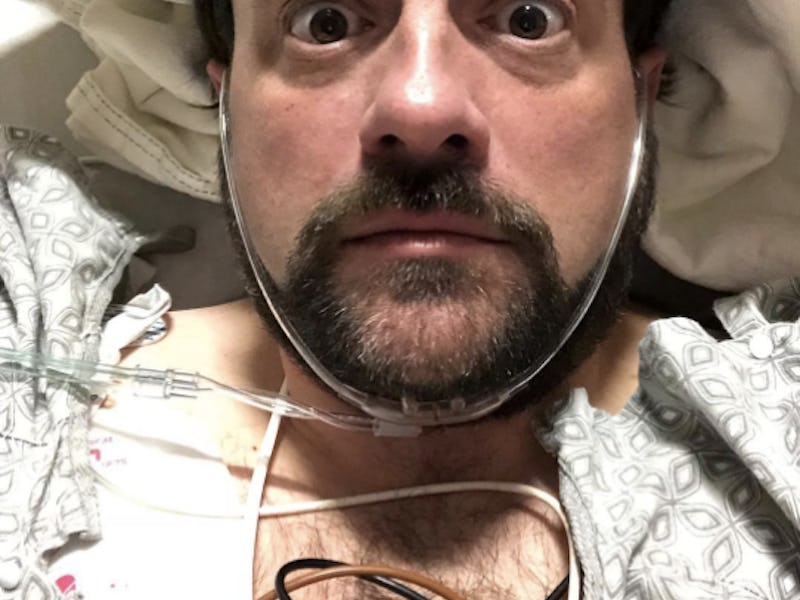A Severe 'Widow-Maker' Sent Director Kevin Smith to the ER
The beloved director survived a medical emergency.

Late on Sunday night, beloved New Jersey director and geek media personality Kevin Smith started experiencing weird symptoms while performing stand-up in Los Angeles. First he felt nauseous, then his chest began to feel heavy, and soon he was “sweating buckets.” Smith was rushed to Glendale Hospital, where he was quickly treated for a medical emergency ominously nicknamed the “widow-maker.”
Smith, aged 47, posted a selfie from his hospital bed to Twitter and Instagram early on Monday morning. In the caption to his Instagram post, he explained that the widow-maker is so named because “when it goes, you’re a goner.” It’s used to refer to a certain type of heart attack in which a blood vessel called the LAD — the left anterior descending artery — gets blocked. Of all the channels that support the heart, the LAD is often considered the most important because it supplies such a large volume of blood.
The heart, a roughly fist-sized organ just left of center (from your perspective), needs to be supplied with blood to keep working, just like any other organ. When a heart attack occurs — technically known as a “myocardial infarction” — there’s a decrease in the amount of blood that reaches the muscles of the heart, and so they become damaged and stop working. Very often, that decrease is due to blockages in the arteries caused by coronary artery disease. And when those blockages occur in the LAD artery, like they did in Smith’s case, the results can be fatal.
The left anterior descending (LAD) artery feeds the majority of blood to the heart's left ventricle.
That’s because the LAD artery — the biggest of the three arteries that supply the heart — supplies blood to most of the front wall of the heart as well as the side walls. When the LAD artery gets blocked, the entire front wall of the heart loses its blood supply, and as the muscle cells there start to die the heart’s ability to function starts to break down. The nausea, heavy chest, and sweating that Smith started to experience on stage are all a result of his heart’s reduced ability to function properly.
“A widowmaker heart attack occurs when that artery suddenly goes from 80% or 90% narrowed to 100% narrowed,” said Dr. Richard Katz, director of the George Washington University Heart and Vascular Institute, in an interview with Time in early February. “It happens very quickly, and suddenly you’re depriving a large chunk of that heart muscle from oxygen.”
When the effects of decreased blood supply to the heart are severe enough, the heart can start beating very rapidly in a rhythm called ventricular fibrillation. In its weakened state, the heart can’t sustain this sort of activity, and so sudden cardiac arrest — when the heart simply cannot pump anymore — sometimes occurs, leading to death.
Fortunately widow-makers and other heart attacks are not fatal if the heart’s blood supply is rescued in time. In his post, Smith said he received an emergency stent — a tube of wire mesh meant to prop up a narrow artery — into the “lethal” widow-maker, allowing blood flow to the front wall and side walls to resume.
Stents usually stay in the body permanently, but follow-up treatments for heart attacks require bigger lifestyle changes to diet and behavior to prevent arteries from experiencing more blockages in the future. Often, this includes taking blood-thinning drugs (to make blood flow more easily through narrow blood vessels), eating foods that are low in salt and saturated fats that won’t add to blockages in the blood vessels, and finding ways to reduce stress.
Smith, who noted in his post that his father also died of a massive heart attack, seems well aware of the risks. “This is all a part of my mythology now and I’m sure I’ll be facing some lifestyle changes (maybe it’s time to go Vegan),” he said.